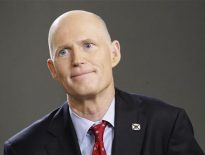(Reuters) – Virginia’s Republican Governor Bob McDonnell introduced
amendments on Tuesday to soften controversial legislation requiring voters to present valid identification to cast a ballot
in elections.
speaks at the Conservative Political Action Conference (CPAC) during their annual meeting in Washington, February 19, 2010.
REUTERS/Joshua Roberts
Virginia lawmakers had earlier passed bills requiring voters to
present valid identification to cast ballots, and giving those who did not bring their IDs a day to present them to election
officials to ensure their votes were counted.
But McDonnell, often mentioned as a possible vice presidential
contender, sent the measure back to lawmakers, saying voters should be given more time – until the Friday after an election –
to present proper identification.
McDonnell also proposed allowing officials to validate provisional ballots given to
those without proper identification by comparing their signatures at the voting booth with those on file with the state
election board in the absence of valid identification.
“Ensuring the security, fairness and openness of our elections
are cornerstones of a strong democracy,” McDonnell said in a statement. “For people to have faith in their government, they
must have faith in their elections.”
Voter ID laws in a number of states with Republican governors and legislative
majorities have drawn objections from Democrats, who say the measures suppress the vote of low-income, minority and elderly
voters.
Thirty U.S. states currently have laws requiring that voters show at least some type of identification to vote
in November, according to the National Council of State Legislatures.
Several states have enacted voter photo ID laws
since the start of 2011 including Texas, Wisconsin, Kansas and Pennsylvania, though the U.S. Justice Department has blocked
the Texas law and a state judge has blocked the Wisconsin law.
McDonnell’s proposals in Virginia also include
broadening acceptable identification to include community college identity cards and removing a clause relaxing the voter ID
requirements if an election officer recognizes the voter.
The Virginia General Assembly will consider the amendments
when the session reconvenes next week.
(Editing By Cynthia Johnston and Eric Beech)





